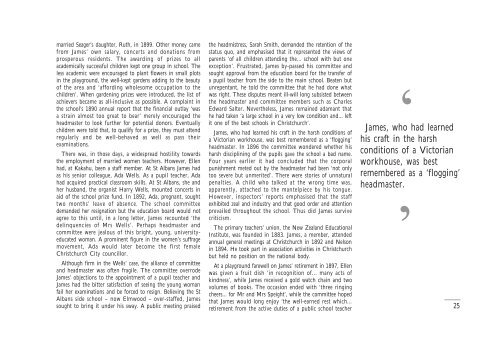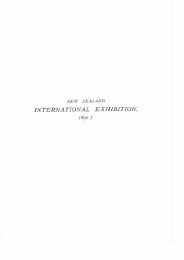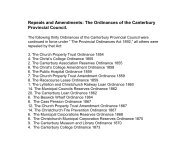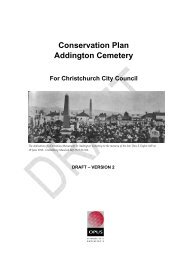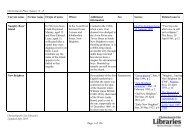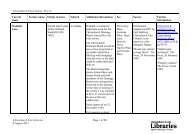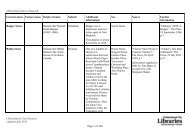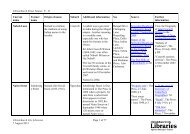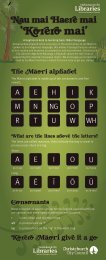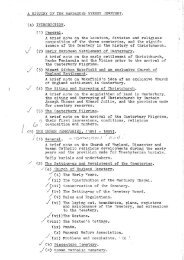Rich man, poor man, environmentalist, thief - Christchurch City ...
Rich man, poor man, environmentalist, thief - Christchurch City ...
Rich man, poor man, environmentalist, thief - Christchurch City ...
Create successful ePaper yourself
Turn your PDF publications into a flip-book with our unique Google optimized e-Paper software.
married Seager’s daughter, Ruth, in 1899. Other money came<br />
from James’ own salary, concerts and donations from<br />
prosperous residents. The awarding of prizes to all<br />
academically successful children kept one group in school. The<br />
less academic were encouraged to plant flowers in small plots<br />
in the playground, the well-kept gardens adding to the beauty<br />
of the area and ‘affording wholesome occupation to the<br />
children’. When gardening prizes were introduced, the list of<br />
achievers became as all-inclusive as possible. A complaint in<br />
the school’s 1890 annual report that the financial outlay ‘was<br />
a strain almost too great to bear’ merely encouraged the<br />
headmaster to look further for potential donors. Eventually<br />
children were told that, to qualify for a prize, they must attend<br />
regularly and be well-behaved as well as pass their<br />
examinations.<br />
There was, in those days, a widespread hostility towards<br />
the employment of married women teachers. However, Ellen<br />
had, at Kakahu, been a staff member. At St Albans James had<br />
as his senior colleague, Ada Wells. As a pupil teacher, Ada<br />
had acquired practical classroom skills. At St Albans, she and<br />
her husband, the organist Harry Wells, mounted concerts in<br />
aid of the school prize fund. In 1892, Ada, pregnant, sought<br />
two months’ leave of absence. The school committee<br />
de<strong>man</strong>ded her resignation but the education board would not<br />
agree to this until, in a long letter, James recounted ‘the<br />
delinquencies of Mrs Wells’. Perhaps headmaster and<br />
committee were jealous of this bright, young, universityeducated<br />
wo<strong>man</strong>. A prominent figure in the women’s suffrage<br />
movement, Ada would later become the first female<br />
<strong>Christchurch</strong> <strong>City</strong> councillor.<br />
Although firm in the Wells’ case, the alliance of committee<br />
and headmaster was often fragile. The committee overrode<br />
James’ objections to the appointment of a pupil teacher and<br />
James had the bitter satisfaction of seeing the young wo<strong>man</strong><br />
fail her examinations and be forced to resign. Believing the St<br />
Albans side school – now Elmwood – over-staffed, James<br />
sought to bring it under his sway. A public meeting praised<br />
the headmistress, Sarah Smith, de<strong>man</strong>ded the retention of the<br />
status quo, and emphasised that it represented the views of<br />
parents ‘of all children attending the... school with but one<br />
exception’. Frustrated, James by-passed his committee and<br />
sought approval from the education board for the transfer of<br />
a pupil teacher from the side to the main school. Beaten but<br />
unrepentant, he told the committee that he had done what<br />
was right. These disputes meant ill-will long subsisted between<br />
the headmaster and committee members such as Charles<br />
Edward Salter. Nevertheless, James remained ada<strong>man</strong>t that<br />
he had taken ‘a large school in a very low condition and... left<br />
it one of the best schools in <strong>Christchurch</strong>’.<br />
James, who had learned his craft in the harsh conditions of<br />
a Victorian workhouse, was best remembered as a ‘flogging’<br />
headmaster. In 1896 the committee wondered whether his<br />
harsh disciplining of the pupils gave the school a bad name.<br />
Four years earlier it had concluded that the corporal<br />
punishment meted out by the headmaster had been ‘not only<br />
too severe but unmerited’. There were stories of unnatural<br />
penalties. A child who talked at the wrong time was,<br />
apparently, attached to the <strong>man</strong>telpiece by his tongue.<br />
However, inspectors’ reports emphasised that the staff<br />
exhibited zeal and industry and that good order and attention<br />
prevailed throughout the school. Thus did James survive<br />
criticism.<br />
The primary teachers’ union, the New Zealand Educational<br />
Institute, was founded in 1883. James, a member, attended<br />
annual general meetings at <strong>Christchurch</strong> in 1892 and Nelson<br />
in 1894. He took part in association activities in <strong>Christchurch</strong><br />
but held no position on the national body.<br />
At a playground farewell on James’ retirement in 1897, Ellen<br />
was given a fruit dish ‘in recognition of... <strong>man</strong>y acts of<br />
kindness’, while James received a gold watch chain and two<br />
volumes of books. The occasion ended with ‘three ringing<br />
cheers... for Mr and Mrs Speight’, while the committee hoped<br />
that James would long enjoy ‘the well-earned rest which...<br />
retirement from the active duties of a public school teacher<br />
‘<br />
James, who had learned<br />
his craft in the harsh<br />
conditions of a Victorian<br />
workhouse, was best<br />
remembered as a ‘flogging’<br />
headmaster.<br />
’<br />
25


